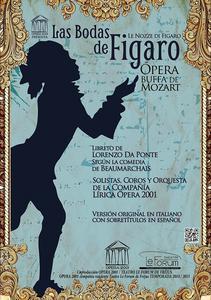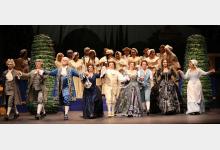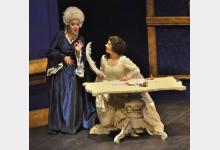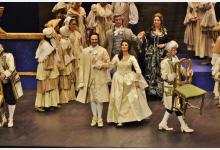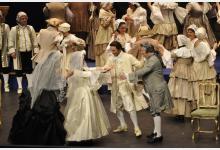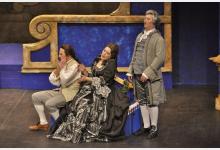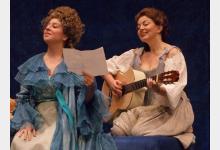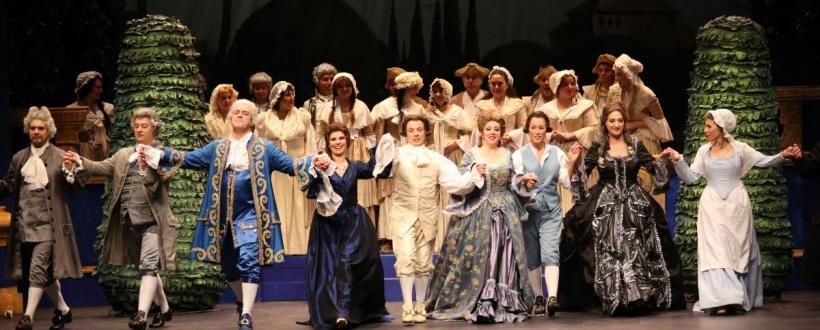
The Marriage of Figaro
Original title: Le Nozze di Figaro
Opera buffa in four acts by Wolfgang Amadeus Mozart
Libretto by Lorenzo Da Ponte
Based on the work by Pierre-Augustin Caron de Beaumarchais,
"le Mariage de Figaro"
Original version in Italian with subtitles
Cast
Musical Director : Martin Mázik
Stage Director : Alexander Herold
Artistic Director : Luis Miguel Lainz
Set & Custom Designer : Alfredo TROISI
Customes : ARRIGO, Milano
Wigs : Mario AUDELLO, Torino
Soloists, Choirs and Orchestra from OPERA 2001
Production: OPERA 2001 in coproducction with the Theater Le Forum in Frejus from which OPERA 2001 is a resident company
CONDE ALMAVIVA, baritone:
Lars FOSSER , Paulo RUGGIERO
FIGARO, baritone:
Nicola EBAU, Javier GALÁN
DOCTOR BARTOLO bass:
Ivaylo DZHUROV
DON BASILIO, tenor:
Paolo ANTOGNETTI
QUERUBINO, soprano:
Inés BERLET, Eugenia BURGOYNE
ANTONIO, bass:
Giancarlo TOSI
LA CONTESA ALMAVIVA soprano:
Natalia LEMERCIER, Berna PERLES
SUSANNA, soprano:
Francesca BRUNI, Linda CAMPANELLA
MARCELLINA Mezzosoprano:
Roberta MATTELLI
BARBARINA, soprano:
Daniela KARAIVANOVA
DON CURZIO, Tenor:
Dimiter DIMITROV
Play's presentation
“Le Nozze di Figaro” is, without doubt, the most perfect Comic Opera ever written. Freed from the tyranny of the Baroque obsession with tears, Lorenzo da Ponte, inspired in turn by the revolutionary play of Beaumarchais that had obtained an enormous success in Paris, offered Mozart an astonishing libretto of almost absolute perfection. Partly a satire on the morals and customs of that period; partly a biting political tract, all wrapped together in a wonderful farce, which in turn is disguised as a high comedy of manners. Quite a feat! And it is quite a challenge for any Director as well. All comedy is fundamentally based on truth. We are firstly presented with a form of reality that we find easy to recognise and identify with. Then this reality begins to become distorted by a series of events that unbalance our sense of the normal: of what ought to be happening. Laughter is the physical mechanism by which we can return to our concept of what is normality. But here a problem presents itself. If a comedy requires a form of normality that is different to that which we are accustomed, how can we bridge this gap on stage? Today there are many voices calling for opera to be made more “relevant” to our age: something that (for reasons which escape me) these days seems to translate into all the singers wearing military greatcoats. My intention is to aim for a production that is based on the reality of its own age, but using the theatrical language of ours, trusting that their culture it is wide (and at the same time widened). Above all, we must grant access to this marvellous comedy by da Ponte, one that enters our very souls through the sublime music of Mozart. That, in their hands, the public can laugh, be moved, and feel the profound truth of all great work of art: that’s me up there!
-- Alexander Herold, Stage Director.
-------------------------------------------------------------------------------
Opera buffa (comic opera) composed in 1786 in four acts by Wolfgang Amadeus Mozart, with a libretto in Italian by Lorenzo Da Ponte, based on a stage comedy by Pierre Beaumarchais, La folle journée, ou le Mariage de Figaro (1784).
Beaumarchais's earlier play The Barber of Seville had already made a successful transition to opera in a version by Paisiello. Although Beaumarchais's Marriage of Figaro was at first banned in Vienna because of its licentiousness, Mozart's librettist managed to get official approval for an operatic version which eventually achieved great success.
The opera was the first of three collaborations between Mozart and Da Ponte; their later collaborations were Don Giovanni and Così fan tutte. It was Mozart who originally selected Beaumarchais's play and brought it to Da Ponte, who turned it into a libretto in six weeks, rewriting it in poetic Italian and removing all of the original's political references. In particular, Da Ponte replaced Figaro's climactic speech against inherited nobility with an equally angry aria against unfaithful wives. Contrary to the popular myth, the libretto was approved by the Emperor, Joseph II, before any music was written by Mozart.
The Imperial Italian opera company paid Mozart 450 florins for the work, this was three times his (low) salary for a year, when he had worked as a court musician in Salzburg.Da Ponte was paid 200 florins.
Synopsis
Location: Count Almaviva's estate, Aguas-Frescas, three leagues outside Seville, Spain
ACT I
At Count Almaviva’s castle the preparations begin for the wedding of Figaro, servant of the Count, with Susanna, the new Countess’s maid. Figaro is surprised that the Count, who had abolished the droit de seigneur in his domains, now wants to act upon it with Susanna. Figaro is willing to act with all of his picaresque and determination to take revenge on his master ("Se vuol bailare, signor Contino"). But Figaro has many enemies: the old Doctor Bartolo who has not yet forgotten how the cheerful ex-barber had deceived him helping the Count to marry his pupil Rosina, now Countess Almaviva (aria "La vendetta”). His old servant Marcellina dreams of marrying Figaro and to that end she wants to use a marriage contract signed by Figaro in exchange for a cash loan that he had given her in the past. The Doctor and Marcellina hope to have the support of the Count to achieve their malicious goals. Marcellina and Susanna hate each other and the young girl cheerfully mocks the grumpy old woman. When Susanna is left alone, arrives Cherubino, the young page of the Count who loves all the ladies in the castle (aria "Non so piu"). He comes to ask Susanna to intercede with the Countess so that they do not throw him out of the castle, because the Count had surprised him alone with Barbarina, the gardener's daughter, Antonio. The young Cherubino loves the Countess. In exchange for a ribbon of hers, he gives to Susanna a song he has written. Suddenly he hears the footsteps of the Count and Cherubino hides behind an armchair. The Count still insists on his desire to seduce Susanna, but she keeps on resisting him. At this point arrives the troublemaker Basilio, and the Count fearing to be seen, hides behind the armchair. Basilio with his indiscreet allusions to Cherubino and the Countess’s love awakens the jealousy in the Count, who ends up coming out of hiding, and outraged, tells how he found the page courting Barbarina. Suddenly he becomes aware of the presence of Cherubino. His wrath and indignation knows no limits: He accuses Susanna of immorality and orders the page his immediate incorporation in the army.
ACT II
Countess ‘s lounge and bedroom at the castle.
The Countess is sad because of the indifference that the Count manifests towards her (aria "Porgi amor"). Susanna arrives and comments with the Countess the lewd intentions of the Count, and then Figaro arrives and explains his plan to discredit the Count, for which he requires the help of the Countess. The Countess, eagerly, offers to help the young couple. The plan is to summon the Count in the garden at night, and instead of Susanna, sending Cherubino disguised as a woman so that the Countess can catch the Count in an offending situation and thus force him to finally agree to the wedding between Figaro and Susanna. They begin to disguise the page, when the furious Count knocks at the door. Cherubino hides in the dressing room. Surprised by his wife frightened attitude, the Count demands her to open the door to the room. The Countess refuses, under the pretext that Susanna is inside changing clothes, but the Count does not listen to reason and decides to look for tools to force the door open, forcing the Countess to accompany him so that nothing changes in the room, which is locked from the inside. The agile Susanna manages to free Cherubino from his hiding place, who dares to jump out of the window in order to save his lady and flee the wrath of the Count. The Countess, distraught, confesses to the Count that the page is the one that is hidden in the room and her husband is then about to break the door. With the shouts ("Esci omai, malnato garzon") the door opens and a smiling Susanna appears. The Countess is as surprised as the Count himself, but she manages to control herself. The Count is forced to apologize to his wife. Figaro arrives announcing that the guests are all gathered. Antonio the gardener appears, he is complaining about someone jumping out of the window and breaking some pots. He also brings a letter found among the flowers. Figaro thinks that it is from the Count and addressed to his future wife, the Count believes it may very well be from some lover of Countess Rosina. At that time Dr. Bartolo and Marcellina arrive, with Basilio, to demand to the Count the debt that Figaro has with Marcellina: either he returns the money or he marries her. For now, the wedding is postponed until the issue is clarified.
ACT III
Great hall of the castle.
Susanna pretends to the Count that she finally accepts to have sex with him (duet "Crudel perché fin'ora"), but she commits the indiscretion of telling Figaro that she has already won the case, and the Count hears it and realizes that they are setting a trap for him (aria "vedro mentr'io sospiro"). Marcellina arrives, with Doctor Bartolo, Figaro and the notary Don Curzio, who decides that the sentence must be (“or pay or marry Marcellina"). Figaro, seeking a pretext, claims that he does not have his parent’s permission to marry since he was stolen when he was a kid, but that he has a mark in his arm that would identify him. Marcellina is moved and recognizes in Figaro the child that Doctor Bartolo had, who was stolen by gypsies. They will hold one more wedding: Marcellina will marry Dr. Bartolo. The Countess regrets her years of lost love (aria "Dove sono") and makes the decision to continue with the farce plotted by Figaro, only now it will be herself who will attend to the meeting and unmask her husband. Rosina and Susanna change clothes, the lady becoming the maid and she the lady, and they head for the garden, where they will meet their respective suitors.
ACT IV
Garden by the castle.
Susanna, as she waits for the Count next to the pavilion, sings an inspired aria, while Rosina is hiding at another part of the garden. Cherubino shows up, and believing that the Countess is his beloved Barbarina, kisses her passionately. The Count surprises them both and confusing his wife with Susanna he gets angry, because before belonging to him she is already deceiving him. Figaro and the gardener's daughter appear, who, each one separately, were also summoned to the garden at the same time. A terrible confusion takes place, which threatens to end badly, when the Countess and her maid decide to put an end to the charade crediting their respective personalities. The Count accepts the lesson, which has been given to him so appropriately, and promises his wife to forever renounce to his love adventures. The Countess forgives him and everything ends in the midst of general rejoicing.

